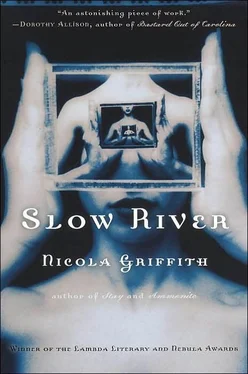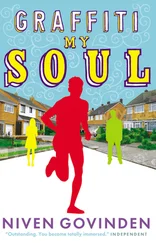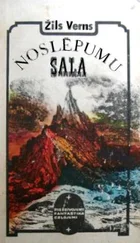I stepped carefully back from the edge.
Lore is eight. One afternoon she sits with Oster in his office, watching patiently while he scrolls through several resumes. Her parents are just starting the cycle of argument and recrimination that will end in divorce a dozen years later, but Lore does not yet know this. All she knows is that her mother has accused her father of being out of touch with the workings of the vast organization of which he is the titular head, and her father has decided to take an interest in one of the van de Oest company’s new ventures—the commercial production of fuel-grade ethanol.
He is talking half to himself and half to Lore as he works. “Now, do I choose this woman, the gene splicer, or should I go with James here, who performed so well on our Australian project?” Lore cranes over his shoulder, trying hard to understand exactly what her father is getting at. “Or maybe Carmen Torini?” He smiles at Lore then. “Stop peering from behind me like that. Get your own chair. Pull it up.”
Lore does, feeling very grown-up at the sight of their two gray heads reflected side by side in the computer screen, like equals.
He pulls up the three resumes. “Here we have three people who might do. This one is a researcher. They think in a certain way. They like elegance, theories. For this project we need someone different, someone who can smile and say, ‘Well, that didn’t work. Let’s try again.’ So then we come to James. He can make people work beyond themselves—look at what he did in Bulgaria last year when what we thought would be a simple bioremediation of a phenol spill turned so complicated.” Lore loves it that he does not turn to her and ask if she knows what phenol is, or what bioremediation means. He trusts her to ask, or to look it up later. “But they were all tried-and-tested techniques, Nothing new or innovative there.”
Lore frowns. “But if what he did worked, why isn’t that good enough?”
“You could ask your mother that.” He shakes his head. “Sorry.” He taps the screen. “It’s not so much what he did, it’s what he didn’t do. No brilliant shortcuts. No new high-efficiency methods. No record of him even contemplating anything not already done.”
“Not everyone can think of new things.”
“No, and there’s a place for good, steady people like James. Our business is built on them. But the reason we’re a leader, the reason we’re so rich, little one, is that your grandmother, and your great-great-uncle before her, did think of new things, and were smart enough to patent them.” He smiles gently. “And I was smart enough to marry your mother.”
Lore says nothing to that. She senses that there is a great sadness in her.father, but she knows, somehow, that it is not something she can fix. She does not want to think about it. “Who’s Carmen?”
He pulls up a picture of a woman of about thirty: black curls, brown eyes, a touch of arrogance. The picture shifts to the corner of the screen and three text boxes appeared. “She hasn’t been with us long. Joined up from EnSyTec four years ago. Started as a quality control manager. Moved up to assistant project manager. Then your mother chose her to head that project in Caracas.” He frowns. “Lots of innovation there.”
Her father stares at the screen for a long time, Lore wonders what he is thinking about. He looks sad again.
He switches the terminal off abruptly and turns to face Lore. “I’m not like your mother. She always has to be doing, always in control. That’s good, in its way, but it’s not my way.”
Lore nods, wondering if he expects her to take sides. He sees her wariness.
He ruffles her hair, laughs. “Don’t look so serious, little one. People are allowed to be different.” Lore wonders if her mother knows that. “Shall I tell you why this organization works so well without me? I understand good management. Some people would rather hire people less intelligent than themselves, thinking that in comparison they will look great. But that’s not the way it really works. The secret of good management is to appoint smart people to work for you. It makes you look good, and it means you don’t have to do so much work. Remember that.” Then he looks very sad and says in a low voice that Lore is not supposed to hear, “And if you’re as good at it as I am, you become redundant.”
Lore is ten when the family moves. The company is not the same as the family, Lore’s father is fond of saying, and it is time they had a place where they can put down roots, where Tok and Greta and Katerine can come home from their various projects and rest; where Stella can join them if she chooses; where Oster himself can stop off on the way to and from meetings in Beijing and Singapore, and Lore can come during school holidays. Where they can learn to be a family again.
Katerine leaves all the details to Oster. “Just make sure it’s finished—” She checks her schedule. “—by early March. I have a window then.”
The Buccaneer Archipelago lies off the northern coast of Western Australia. Cicely Island, near the southern tip of the chain, is all black rock, lush tropical foliage, and white beach. Oster buys it, renames it Ratnapida, Island of Gems, and builds a house.
Lore is the first to see it. Oster comes to her school in Auckland three days before the end of term. “I want you to see it fresh, as it’s supposed to be.” And though they fly from Auckland to Perth, then take a copter from Perth to Beagle Bay, Oster insists they travel the last ninety miles to Ratnapida, Island of Gems, by boat.
“The key to this place is leisure. It has to be approached in the right spirit. You and I can appreciate that.”
The boat is a two-masted yacht but the wind is in the wrong direction so the captain uses the silent magnetic water propulsion. The noise of the sea is eerie.
It is mild for the subtropics, eighty degrees, and Oster wears shorts and a life jacket. They head northwest along the coast and the afternoon sun shines directly on his chest. The wiry gray body hair is almost golden in this light, and all of a sudden Lore knows what color his hair would be if his mother had not turned off her color-producing allele. She wonders idly what color hair her mother would have. One could often tell natural hair color from a person’s eyes… She has seen her mother with brown eyes and black, violet and deep blue, green and hazel, but realizes with a shock that she does not know their real color. She has no idea of the color of her mother’s eyes. She nearly asks her father, but does not: she is scared he might not know.
The boat docks at a wood and stone quay in a bay that has been scooped out of the black, volcanic rock. The island ascends in tiers of path and step and miniature waterfall to the house. When Lore sees it she understands immediately that this is her father’s way of proclaiming who he is. His way of dyeing his hair. She also knows her mother will hate it.
“It’s beautiful!”
Oster smiles.
It takes them more than an hour to climb to the house because Oster wants to show her every pond, every silent carp and lily, every arrangement of stone and water and hidden grotto. Lore follows him from pool to bench to bright bloom, laughs when a huge blue butterfly lifts from a purple flower by her feet. The gardens are very like him: playful, rich, and secret. Eventually they reach the top of the rise, where the secret places give way to formal grounds which give way to patio, then porch, then the house itself, almost as if there is no dividing line between inside and out.
The house is based on Indonesian styles: polished wood, high ceilings and low, stone sculpture, water, cool rooms. The gates are old iron filigree, the doors imported from a recently demolished temple. Lore is walking through her third room of wood and screen and slowly moving ceiling fans when she realizes she has not seen a single net terminal.
Читать дальше












